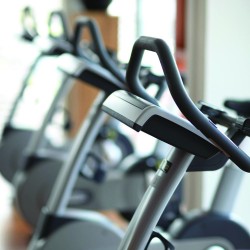Functional Capacity Testing measures your body’s ability to adapt to a measured load of stress placed upon it. With the information provided from a successful Functional Capacity Test, we will be able to determine your current level of fitness, find a reasonable goal for your desired fitness activities and finally program and prescribe your new or modified active lifestyle. The results from the functional capacity test will help us determine the frequency of your training, type of activity you can train in safely, how intense you can train in that discipline, and how long each session should last at that given intensity. Before we can program your periodized schedule, we will need to choose the test that is right for you.
Event consists of swimming 500 yards or 450 meters in fastest time possible. Any swim stroke and turn may be used and will only be conducted in a standard 25 or 50 yard/meter swimming pool.
a. Swim Event Procedures:
- Swimmers will begin test in water; i.e. no diving starts.
- CFL/ACFL will announce the start as well as number of pool lengths and associated times until member has completed either 500 yards or 450 meters.
- Time is recorded with a stopwatch to nearest second.
- Swimmers may push off from sides with hands and feet after each pool length.
- Resting is permitted by holding side of pool, standing, or treading water.
- Members may use goggles, facemasks, swim caps, and/or ear plugs. Fins , snorkels, flotation, wet suit, and propulsion devices are not authorized. Swim event is ended when member:
- Completes prescribed distance.
- Receives or requires assistance from CFL, ACFL, lifeguard, or other person.
Source: United States Navy
The specific test you take should be dictated by the results of your pre-exercise health screening. Your trainer should find any contraindications to physical activity, if any, and choose the appropriate apparatus to test your max or sub-maximum capacity from there. Contra-indicative injuries such as meniscal tears (tearing of the cartilage in the knee complex) would indicate that a high-impact Graded Exercise Test (GXT) treadmill would be an inappropriate choice. Your trainer should opt, instead, for a low impact sub-maximal test like the U.S. Navy PRT 500yd / 450m Swimming Test if resources are available.
Various tests are available for testing functional capacity which range in complexity and physical demand on the various joints and extremities of the body. From a low-impact Forestry Step test ,where the athlete is asked to maintain a 90 beat 4-step cadence on a wooden bench, aerobic step or box, To the maximal GXT on the treadmill where the runner is asked to increase in speed while the treadmill is increased in steep grade. Unlike the Step test, the GXT is finished when the test subject reaches his/her fatigue point.
Vitals, Heart Rate, Blood Pressure, and Perceived Exertion, are monitored throughout the various tests to determine the bodies ability to adapt to the increase of the controlled load placed on it. Vitals are also monitored as well as a string of communication between the proctor and testing athlete to minimize the potential of injury, cardiac event or death in maximal testing situations. The proctor will terminate the exam at the first sign of complications, major form failure or upon request from the subject.
Carolina Gold Fitness has proven successful in interpreting these tests for use in prescribing daily, weekly, monthly and annual exercise routines to meet all goals. We have the right test for almost all populations and abilities. If you would like to schedule a Functional Capacity Test in a safe, monitored setting, Contact CGF for more information.

